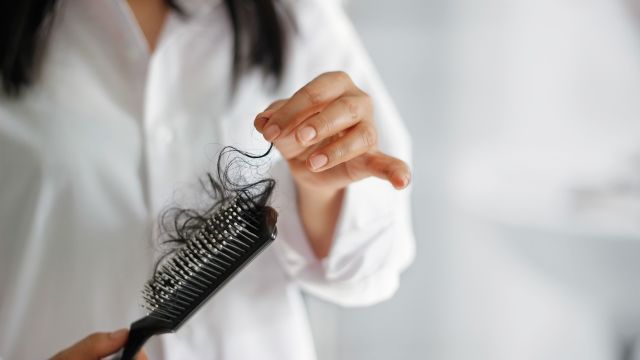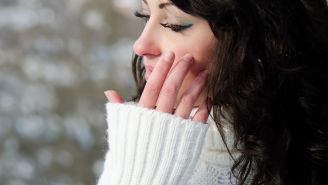Updated on March 17, 2025.
There are roughly 80,000 to 120,000 hair follicles on your head, and it’s typical to lose around up to 100 strands of hair a day. More than that could indicate a hair loss or regrowth problem, which is commonly caused by styling damage, medications, stress, poor diet, or a condition known as androgenetic alopecia.
Androgenetic alopecia is a hereditary disorder that affects an estimated 30 million women and 50 million men in the United States. It’s the medical term for female-pattern hair loss and male-pattern baldness. The condition is different from telogen effluvium, which is a temporary hair loss that can occur with childbirth, severe infections, or other stressors.
Without treatment, androgenetic alopecia is permanent. It can present itself prematurely during a woman’s adolescent years—although it usually occurs after menopause.
While other types of alopecia can be caused by tight hairstyles and hair treatments, androgenetic alopecia is triggered by an imbalance of androgens, or male sex hormones. As a result, the body's hair cycle shortens, resulting in thinning hair or patches. For women, androgenetic alopecia may also be related to:
- Aging
- Heavy blood loss during menstruation
- Certain medications, such as oral birth control pills that contain estrogen
- A family history of androgenetic alopecia in men or women
Hair loss for women with the condition generally begins at the top of the scalp and then spreads out from the center part of the hair. It may worsen over time. However, it is rare that a woman will become completely bald or have a receding hairline.
How hair loss may affect mental health
While treatments are available to help people diagnosed with androgenetic alopecia, there is no cure. As a result, the condition can take a toll both emotionally and socially. Women may experience poor body image, depression, and low self-esteem. Anxiety and stress are also common among those with hair loss, and they may keep people from enjoying social activities.
If hair loss is affecting your well-being, your healthcare provider (HCP) may recommend seeing a mental health professional who can offer emotional support tools and guidance.
Diagnosing androgenetic alopecia
Androgenetic alopecia may present itself through a thinner ponytail, a widening part, and loss of hair volume. Women who’ve gone through menopause or have a family history of the condition have an increased risk. To diagnose the condition, your HCP will do a physical exam, talk with you about when you first began noticing hair loss, and review your personal and family medical history with you.
Diagnosis may also include blood, skin biopsy, and hair follicle tests. These tests can help address other medical conditions that may be related to androgenetic alopecia, such as polycystic ovary syndrome. They can also determine if your hair loss is due to other common causes, such as iron deficiency, thyroid disease, skin disorders, lupus, or diabetes.
In addition to ruling out other reasons for your hair loss, your HCP will check for signs of excess male androgen hormone to help diagnose androgenetic alopecia. Signs may include menstrual cycle changes, an enlarged clitoris, new skin acne, and new hair growth that’s abnormal, such as hair growth on the face or below the belly button.
Treatments for androgenetic alopecia
While there is no permanent cure for androgenetic alopecia, it can be treated with medication. Certain medications have been shown to be effective in hair growth or slowing down hair loss, usually with few side effects.
HCPs typically begin treatment with creams or medication that contain minoxidil (Rogaine), which can be applied directly to the scalp and have been shown to help stop hair loss. Minoxidil is available over the counter or in prescription (pill) form. People who are breastfeeding, pregnant, considering becoming pregnant should avoid using it.
Other prescription pill medications used to treat the condition include the anti-androgens spironolactone (Aldactone) and finasteride (Propecia), which may help hair growth return back to normal. Sometimes medications are combined with platelet-rich plasma (PRP) injection therapy. HCPs may also prescribe a special shampoo called ketoconazole, certain birth control pills, laser therapy, or hormone therapy to help treat the condition.
Another option is hair transplant surgery. During this procedure, hair follicles are implanted into bald or thinning spots on the scalp to help even out the hair.
Some people diagnosed with androgenetic alopecia also choose lifestyle remedies, such as a new hairstyle; wearing wigs, extensions, or hairpieces; eating a protein-rich diet; taking vitamins; and engaging in stress management activities.
You can work with your HCP to help manage androgenetic alopecia if you feel you may be losing too much hair. They will be able to determine the specific reason for your hair loss and create a treatment plan that’s right for you.






